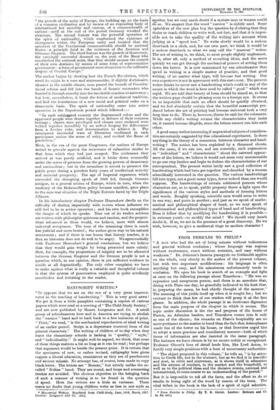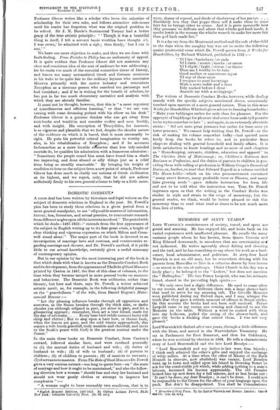FROM PERICLES TO PHILIP.*
" A MAN who had the art of being minute without tediousness and general without confusion ; whose language was copious without exuberance, exact without restraint, and easy without weakness." Dr. Johnson's famous panegyric on Goldsmith applies on the whole, very closely to the author of the present volume, but with two important modifications : his language is often anything but easy, and his minuteness unfortunately tends to confusion. We open his book in search of an example and light at once on the following passage about Timothoos " He was an expensive and sumptuous person, and there is an anecdote that, dining with Plato one day, he gracefully indicated to his host that, in preparing the menu, he had chiefly thought of the morrow." The meaning of this yields itself up when it is sought for ; but wo venture to think that few of our readers will grasp it at the first glance. In addition, the whole passage is an irrelevant digression from the main purpose of the chapter in which it occurs. The topic under discussion is the rise and progress of the house of Pardon, an Athenian banker, and Timothoos comes into It only as one of the clients ; his remarks on Plato's hospitality are no more pertinent to the matter in hand than the fact that Aristophanes made fun of the tower on his house, or that Isocrates urged him to adopt a more gracious and conciliatory manner—both of which items of information are also inserted in the same paragraph. The instance we have chosen is by no means unfair or exceptional. Professor Glover's love of detail leads him, like Lord Acton, to fortify very simple positions with a host of unnecessary authorities: " The object proposed in this volume," he tells us, " is by after• tion to Greek life, not in the abstract, but as we find it in traveller and poet, in critic and statesman, as it shows itself in education and the axioms of conduct, in the market and the household, as well as to the political ideas and the decisive events, notional and international, to come nearer to an understanding of the period." But It is impossible to tell all the facts, and the effort to do so remelts in losing eight of the wood by reason of the trees. The vital defect in the book is the lack of a spirit of rigid selection.
• lens Perkin to Philip. By T. B. Glover. London: Methuen sad Co. D. ed. sell
Professor Glover writes like a scholar who loves the minutiae of scholarship for their own sake, and follows attractive side-issues until his reader has forgotten what was the original problem to be solved. Sir J. M. Barrio's Sentimental Tommy had a better grasp of the true artistic principle : " ' Though it was a beautiful thing in itself, I felt a servant lassie wouldns have thought o't. I was weer,' he admitted with a sigh ; then firmly, but I cut it out.' " We have one more objection to make, and then we are done with fault-finding. From Pericles to Philip has no uniformity of appeal. It is quite evident that Professor Glover did not maintain any clear and consistent idea of the sort of audience he was addreesinll ; for ho omits too much of the essential connective tissue of history, and leaves too many untranslated Greek and German sentences in his wake to be quite fair to the ordinary layman who associates Minerva primarily with the motor industry and remembers Xenophon as a tiresome person who marched ten parasangs and had breakfast ; and if he is writing for the benefit of scholars, he has put in far too much elementary narrative and analysis with which they are already familiar.
It must not be thought, however, that this is " a mere repertory of miscellaneous and officious learning," or that " we are con- versing with some dreaming pedant with his elbow on his desk." Professor Glover is a genuine thinker who can get away from text-books and tradition and consider ovehts and men freshly, and with insight. His conception of Thucydides, for instance, is so vigorous and plausible that we feel, despite the slender nature of the evidence on which it Is based, that it must necessarily be right. He puts his powerful critical imagination to worthy nee, also, in his rehabilitation of Xenophon ; and if he accounts Isehomschus as a more lovable eltracter than loss tidy-minded mortals do, he qualifies his admiration with a humorous admission " Sometimes the people round him must have found him a shade too improving, and done absurd or silly things just as a relief from being so steadily reasonable." By bringing his weight of erudition to boar en the subject from a new point of attack, Professor Glover has done much to clarify our notions of Greek civilization at its highest, and we regret, only, that he did not adhere sufficiently firmly to his own general scheme to help us a little more.















































 Previous page
Previous page